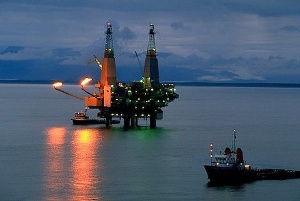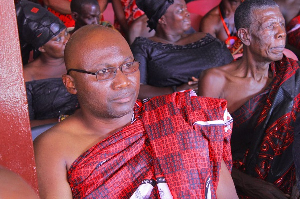Business News of Friday, 24 October 2014
Source: BFT
Tullow unfazed by border dispute
Jubilee Field operator Tullow Ghana says the ongoing border dispute between the country and its western neighbor, Ivory Coast, has no pressing effect on its TEN project.
Charles Darku, the General Manager of the oil-exploration company, assured investors of the listed company that the ongoing arbitration “is not affecting our operations as it’s been dealt with at the governmental level.”
Ghana is presently seeking legal redress to resolve a maritime border dispute with the Ivory Coast, after dialogue and negotiations between the two countries failed to produce a settlement.
The two countries have never officially agreed on their maritime boundary, and their maps of territorial waters overlap. Ghana filed its suit at the International Tribunal on the Law of the Sea last month based on Article 287 Annex VII of the 1982 UN Convention on the Law of the Sea.
The disputed area covers portions of the Jubilee Field, Tweneboa, Enyenra, Ntomme (TEN), the Owo discoveries, the West Tano-1X find and the deep-water Tano block, all found on the west coast of Ghana’s territorial waters.
Tullow Oil’s second major oilfield, the Tweneboa, Enyera and Ntomme (TEN) field, is on schedule to deliver its first oil by mid-2016.
The company said it will spend some US$4billion dollars on the project from 2013-2016.
Under the TEN project, 10 wells are expected to be drilled for oil exploration and production. Eight of those wells have now been dug and the remaining two are expected to be ready in early 2016.
Mark Macfarlene, Deputy General Manager of Tullow Ghana, said the wells are all on schedule and on budget.
Sub-sea installations are ongoing to receive the second Floating Production, Storage and Offloading (FPSO) vessel which is being constructed in Singapore.
Tullow is expected to take delivery of the FPSO by early 2016 for eventual oil production. Initial production is pegged at 85,000 barrels of oil per day.
The legal proceedings will cost the country “a few million dollars,” said Kwame Fordjour Mfodwo, National Coordinator of the Ghana Maritime Boundary Secretariat.
However, the cost of litigation is insignificant compared to the value of oil reserves in the disputed area.
Ghana seeks the extension of its continental shelf to about 15,000 kilometers beyond 200 nautical miles, where preliminary studies have shown the potential for at least eight billion barrels of petroleum reserves.
Ghana is among 50 countries globally that have sought an expansion of their territorial waters.











